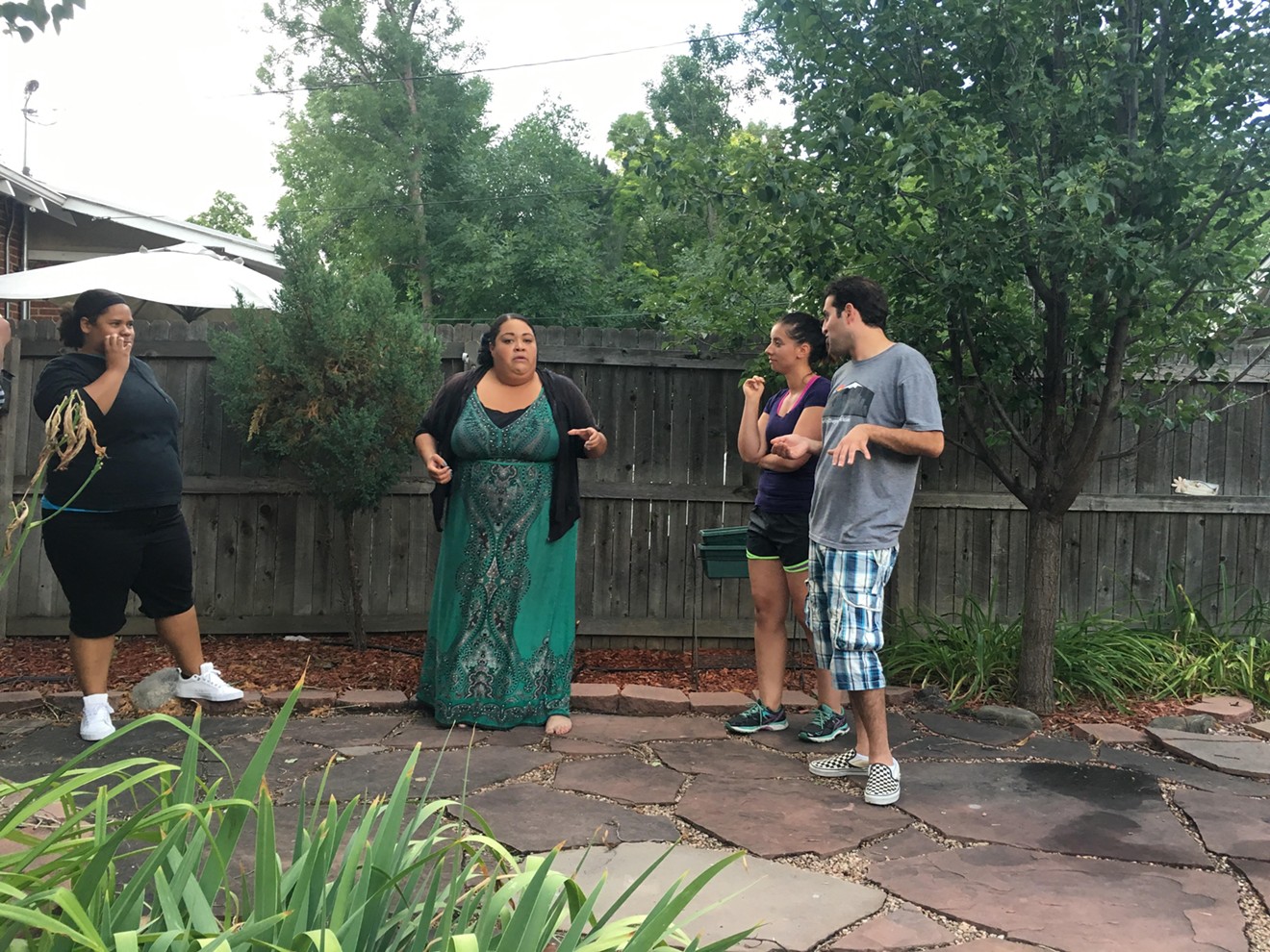To backtrack: The Denver scene is "more diverse than Portland, not as diverse as Queens," explains Nick Trotter, Voodoo's director of education. This is a low bar: The 2010 census lists 72.2 percent of Portland, Oregon's population as white and non-Hispanic. Go to a show in downtown Denver, and you'll find a lot of young, well-off white guys on stage.
"It has always felt like I'm usually the only black lady on the team," says Chelsea Frye, who heads Full Spectrum. She's been acting since attending Denver School of the Arts, but she got into improv ten years ago, prompted to dive in by her mother's final voice mail before her death in a drunk-driving accident. Being one of the few minority improvisers on stage means that Frye's experienced the gamut of micro- (or macro-) aggressions. She'll be on stage, miming like she's styling someone's hair, and a fellow actor will enter, voice sliding into a stereotypical depiction of a sassy black woman. In accordance with the guiding principles of improv, "I'm going to join you...but I'm gonna think about it when I get off stage," Frye says. She's also had audience members shout out vulgarities straight from President Trump's Access Hollywood tape while performing with the all-female improv dance group At the Barre.

At the Barre is an all-female improvised dance troupe. Chelsea Frye is in the upper right corner.
Tom Smaldone
Voodoo's team took action. They changed the theater's mission statement to include words like "all-inclusive" and "diverse" and started monthly meetings to discuss how to increase diversity in improv. These meetings have since been discontinued, however: too much repeated talk and too little concrete action. Trotter says they've reallocated prime-time Friday and Saturday night spots to female- or minority-centric groups, expanded their class times and are working on bringing after-school programs to other areas than their current Jefferson County locations. Still, it's tricky; Trotter outlines how improv is an art form in which you decline to censor your ideas and just go with your gut, but that "doesn't mean it's license to be a dick."
Ultimately, "the locus of real power is on the stage itself," says Trotter, so he approached Frye about starting an all-black improv team. Frye took the idea and ran with it, expanding the concept to include a variety of marginalized performers. And so Full Spectrum was born out of an urge to share a range of lived experiences. "It's time that we asked these questions in a healthy, productive manner," says Frye.
Frye brought together the people clustered around the backyard table, representing "a little flavor from all over the place," she says. In addition to herself and Thomas, the cast includes Tony Nguyen, who immigrated from Vietnam; Priscilla Bloom, who is Puerto Rican and "ninja-assassin funny," according to her fellow players; Corey Martin, a black man who came to Denver from Louisiana; and Shanel Hughes, a relatively new improviser and black woman whose teammates praise her "freshness" and "attitude." Fellow Full Spectrum member Ashley Scroggins, a black lesbian, often finds herself typecast as the "angry black woman" or feels frustrated when the culture-specific suggestions she offers a scene – like a Tyler Perry/Madea reference – are ignored or "edited out." Arash Zadeh, who's an Iranian-American and a "hype man," according to his team, frequently gets relegated to either a terrorist or a taxi driver in scenes.
During the rehearsal, Zadeh greets an imaginary audience (which the troupe acknowledges is likely to be young and white) and introduces his group. He asks for a question that anyone has wanted to ask a minority. Then a few members of the team answer it, sharing their experiences frankly. Next, they clear the stage and begin improvising based on the anecdotes they've just told.
Scroggins and Bloom make hand motions that look like old-school laundering, but then Bloom says, "I didn't know that balloon animals were going to be so hard," and the scene is transformed. Frye and Hughes wander up, asking for a Maya Angelou balloon. The scene wraps up, and another assortment of improvisers takes the stage. In another instance, after Bloom and Thomas discuss their experiences moving to Denver from Missouri and Los Angeles, respectively, a scene develops with foreign-exchange students being welcomed to Bombay High School. Zadeh adopts a thick Indian accent and tells the students that America doesn't have the same level of clear-skied sunshine as India because "your president killed that."
What happens if a question from the audience is flat-out offensive? Thomas says they'll try to figure out the core of the question and respond to that, while Frye imagines replying with something along the lines of, "Hey, man, so much love to you, but that's not an appropriate question, and this is why." The bottom line, she says, is kindness.
Says Frye: "How are we going to mend this gap if we do it in a way that's not with love and compassion?"
Full Spectrum, 8 p.m. Saturday, August 12, Voodoo Comedy Playhouse, 1260 22nd Street, 303-578-0079, $13 in advance, $15 at the door. The show rotates every other Saturday.











